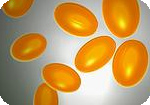| Tuesday, 13 May 2025 Home • About Us • Contact Us |
|
|
|
You are here:
Vitamin E is a fat-soluble vitamin that is found in a wide selection of foods, but many people do not get sufficient amounts from their diet. Generally, the body builds up its own stores of fat-soluble vitamins, but Vitamin E is an exception - which is why it's so important to get adequate amounts on a regular basis.
Vitamin E is one of the most powerful of natural antioxidants and is essential for protecting the body from the damage done by free radicals. It's especially important for cell walls, skin, muscles, nerves, blood vessels and the heart. This vitamin is also important for fertility and boosting the immune system. Vitamin E is protective against heart disease, some forms of cancer (especially of the lung), and, together with Vitamin C, may be useful in the treatment of cataracts. Some long-term Vitamin E studies have shown that the heart-protective benefits are better when high intakes of Vitamin E come from food rather than just relying on supplements. This is probably because foods rich in Vitamin E also tend to be those with high levels of other naturally protective antioxidants. Vitamin E has been called nature's healer because it speeds up wound healing and prevents scarring, actually helping the regeneration of scarred skin. It can also prevent blood clots and reduce blood pressure. Sources of Vitamin E Good sources of Vitamin E are avocado, wheatgerm and wheatgerm oil, sunflower seeds, baked sweet potato, hazelnuts and rapeseed oil. The body's absorption of Vitamin E is increased by Vitamin C and the mineral selenium. Eating vitamin C-rich foods at the same time as those containing Vitamin E helps to ensure maximum absorption. Interestingly, many of the nuts and seeds rich in Vitamin E are also good sources of selenium. Vitamin E Supplements Vitamin E belongs to a group called tocopherols. When buying Vitamin E supplements, choose the natural version, known as d-alpha-tocopherol, and avoid the synthetic one which is called dl-alpha-tocopherol. This is because although natural and synthetic vitamins are normally of equal value because their molecular structures are identical, Vitamin E is unusual because natural and synthetic forms are synthetically different. Scientists have tested to see what effect this difference has on the body. It seems that natural Vitamin E is more biologically active than the synthetic version, which means that the body utilizes natural Vitamin E more easily and is retained for longer in body tissue, enabling it to perform its protective role more efficiently.
Link to this article: Show: HTML Link • Full Link • Short Link
Related Articles:
You must be registered and logged in to comment. |
|
 |
 | |
|
|








